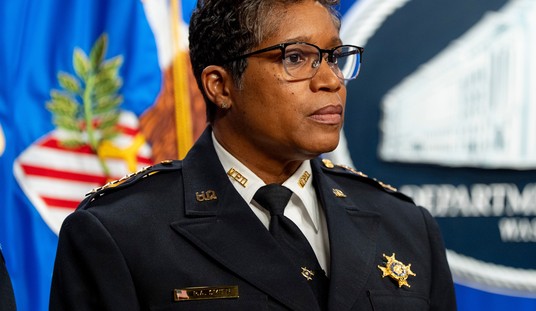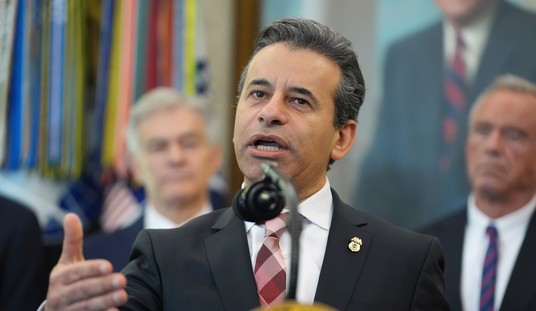Friday was a very bad day for the people responsible for the Keystone Kops operation protecting military voting rights inside the Justice Department. The three ranking members of the House of Representatives with oversight over military voting issues and the Justice Department sent a devastating letter to Assistant Attorney General Tom Perez. The curtain has been pulled back, and the DOJ spin that they are doing everything they can to protect military voters has become a laugh line.
Judiciary Committee Ranking Member Lamar Smith, Armed Service Committee Ranking Member Buck McKeon, and Elections Subcommittee Ranking Member Kevin McCarthy all joined forces to describe the clownish DOJ enforcement tactics in the letter. The problem for Eric Holder is that in just a few weeks, these three will probably shed the title “ranking member” and replace it with “chairman.”
Military ballots were required to be sent by September 18 under federal law. Some states, such as New York, received an extension to October 1. Despite these hard deadlines, nearly a third of states have failed to comply with the law. Military ballots have not been sent and in some cases this means our soldiers overseas are going to lose their right to vote. The public is beginning to see why.
“Public records” and media reports, like the many here at PJM, have “painted a picture of widespread noncompliance with federal law aided and abetted by an enforcement authority that is entirely ineffective,” the congressmen say. Strong stuff, that “aided and abetted” comparison, for it is a term mostly used to describe a criminal enterprise.
The laughs keep coming in the letter: “What we find most troubling about this situation” is that the DOJ “not only failed to ensure compliance but apparently” — get ready for it — “was not even aware when widespread noncompliance occurred.” Perhaps DOJ lawyers should bookmark PJM, because we were reporting on noncompliance days before they made their first calls into places like Illinois and Arkansas!
Here’s the best part: “The only way Members of Congress, the public” and the voters learned that ballots required to be mailed by September 18 hadn’t mailed is because “private organizations took it upon themselves to inquire” — emphasis added on inquire. What the congressmen are pointing out is that the DOJ never picked up the phone. It was the Military Voter Protection Project — an organization run by Lt. Commander (Res.) Eric Eversole that organizes teams of volunteer law students to do the DOJ’s job for them. These volunteers protected our soldiers for free, while bureaucrats in Washington making more than $140,000 a year dropped the ball. Eversole knows firsthand the ineptitude of the DOJ military voting rights management — he worked at the Voting Section and saw it firsthand.
So how did private citizens learn about violations of federal law in places like New Mexico, New York, Arkansas, and Illinois before the DOJ did? That’s where the story shifts from comic to tragic.
Simply, DOJ lawyers trusted informal emails from state election officials without firsthand knowledge that ballots had mailed. The emails came days after the deadline and didn’t even certify that the ballots mailed by the deadline. They only certified they had mailed.
Certified may be too strong a word. The three ranking members note they were “vague and misleading assertions of compliance.” For example, New York’s email message that “purportedly” certifies that all ballots were mailed by the deadline says only the ballots were “transmitted.” “That ‘certification’ includes no assurance that the reports it refers to are true, and does not even purport to state that the ballots were mailed by the October 1 deadline rather than the October 5 date of the email.”
The response of the DOJ lawyer to this motley “certification”?
“Thanks very much for the update,” he wrote back.
That’s it. Nothing else. Full stop.
It appears no call backs were made to the state. No calls were made to the county spot checking whether this was true. And the most amazing thing about this debacle is the person managing it allowed the exact same thing to happen in 2008 in Virginia.
You can read the affidavit from the military voting lawsuit in 2008 here. Except in 2008 the state election official that hoodwinked the DOJ was in Virginia. PJM reported on the 2008 Keystone Kops incident. The precise same thing has happened again in 2010, only the names have changed, and we warned you last July the Keystone Kops were returning for an encore.
If the Department of Justice were truly concerned about enforcement of military voting laws, it would examine whether Section 18 U.S.C. 1001 was violated. This law makes it a crime to lie to a federal official. Some units of the Civil Rights Division use this club to compel cooperation from targets of investigations. Let’s see if they are willing to use it to bolster the Department’s enforcement of military voting rights.
In the real world, when an employee makes a mission-critical error, such as implementing a system that yielded an enormous mission-critical failure in 2008, that employee is either terminated or told that a repeat is unacceptable. In the real world, when a second mission-critical failure occurs two years later, everyone knows the outcome.
But government isn’t the real world. Results don’t matter so much. Spin, redirection, posturing, and sometimes even lies follow mission critical mistakes. Consequences do not. This is especially true with the Eric Holder Justice Department.
Imagine the delivery man who keeps going back to the wrong store, or the waitress who screws up the orders night after night. We all know what happens. Or more to the point, what happened to Commander Christopher R. Van Metre who grounded the U.S.S. Hartford on a reef, or Air Force Captain Joseph Schweitzer when he flew his jet into a ski gondola in the Italian Alps? With our military, it is one and done.
“If the Department has routinely accepted ‘certifications’ like the one provided by New York – or apparently false assertions like the one provided by Illinois – then it is no surprise that compliance” with the mailing deadline “has been inconsistent at best,” the congressmen wrote.
The letter compares the selective enforcement of the law with the New Black Panther dismissal and the refusal to enforce the list maintenance provisions of Section 8 of Motor Voter, two items I testified and wrote extensively about here at PJM.
“Congress relies on the Department of Justice to ensure the laws are followed. The Department’s failure to give meaning to our efforts on behalf of overseas voters is deeply disappointing,” the letter concludes.
The letter speaks for millions of others who share the deep disappointment. On November 2, maybe disappointed Americans can find someone who wouldn’t otherwise vote and drag them to the polls to make up for servicemembers who have lost their right to vote this year.










Join the conversation as a VIP Member